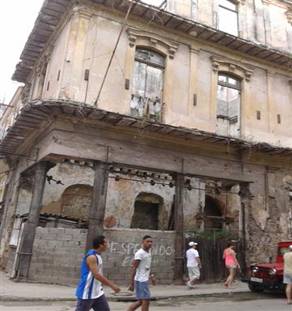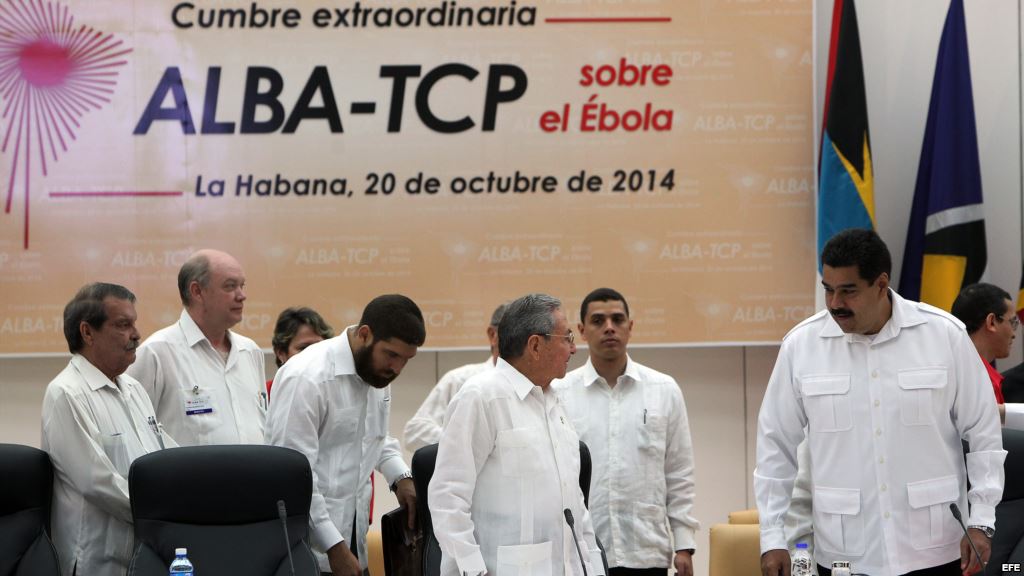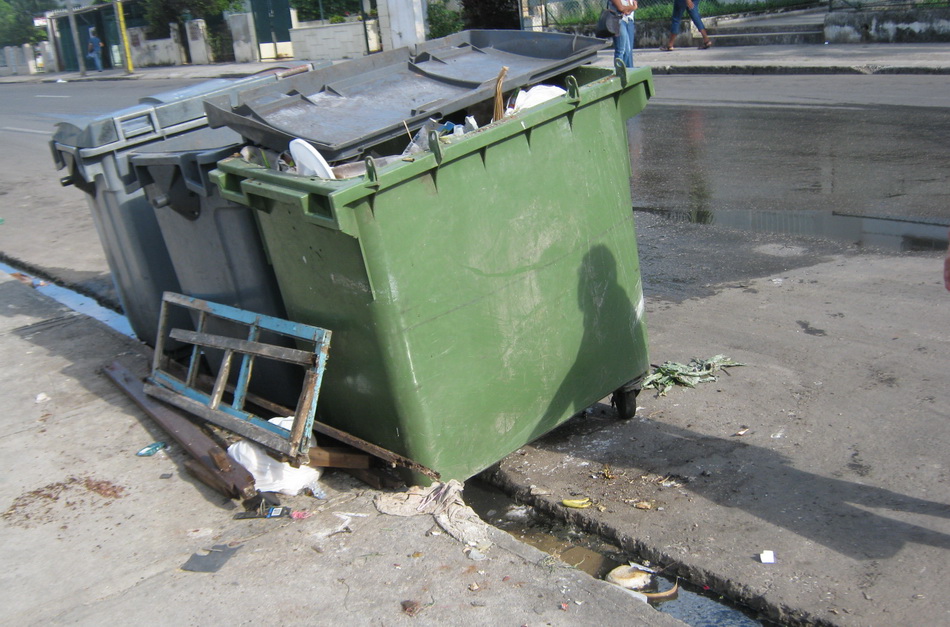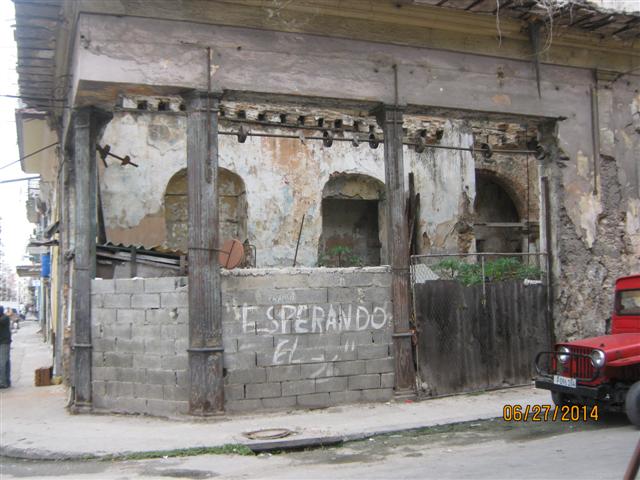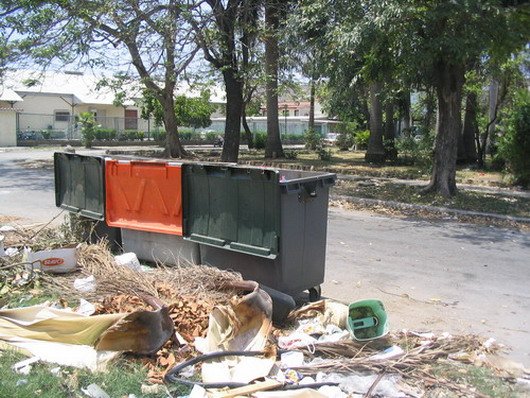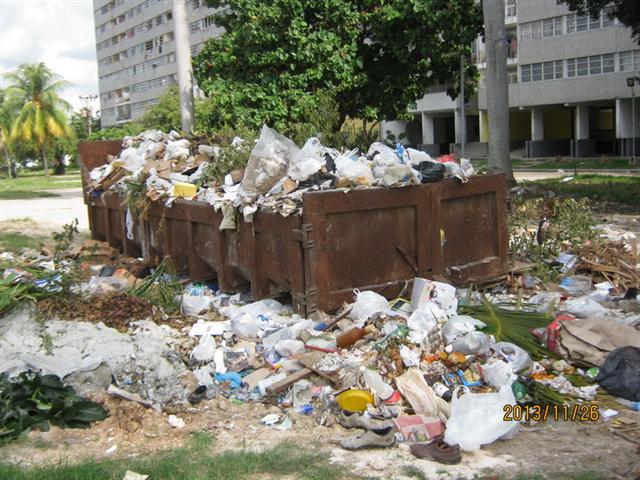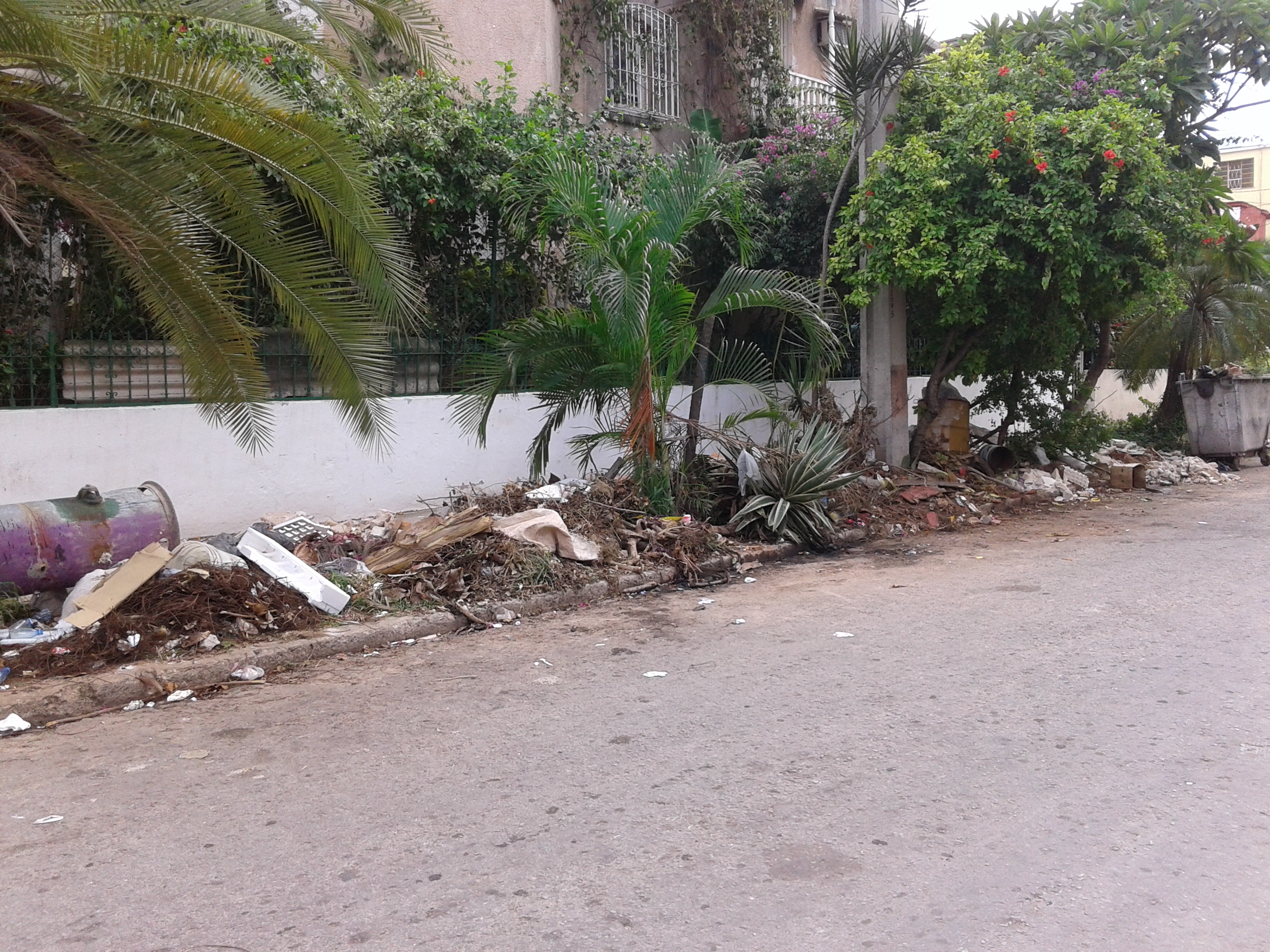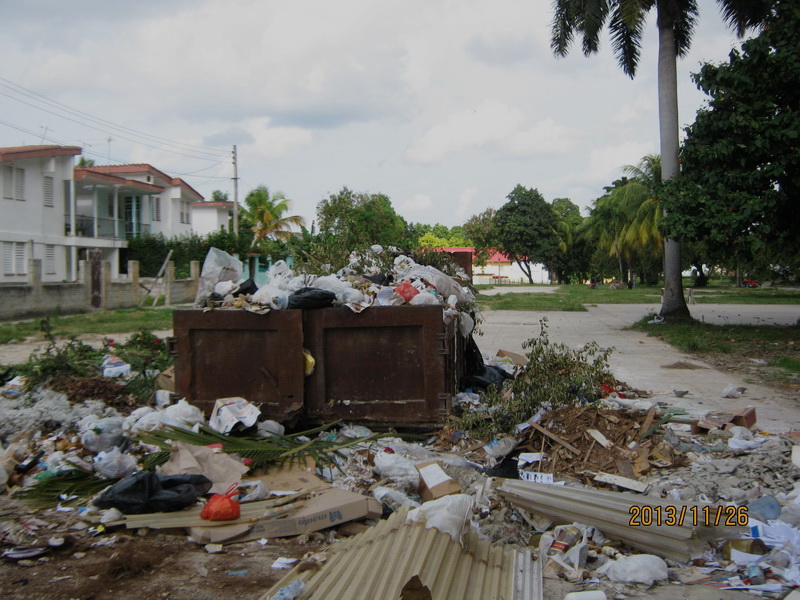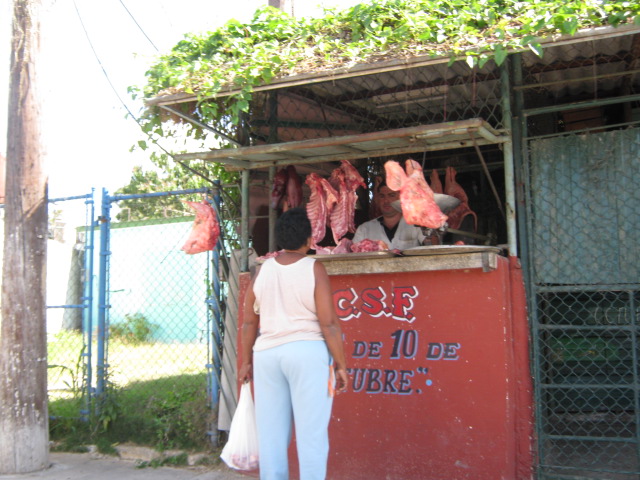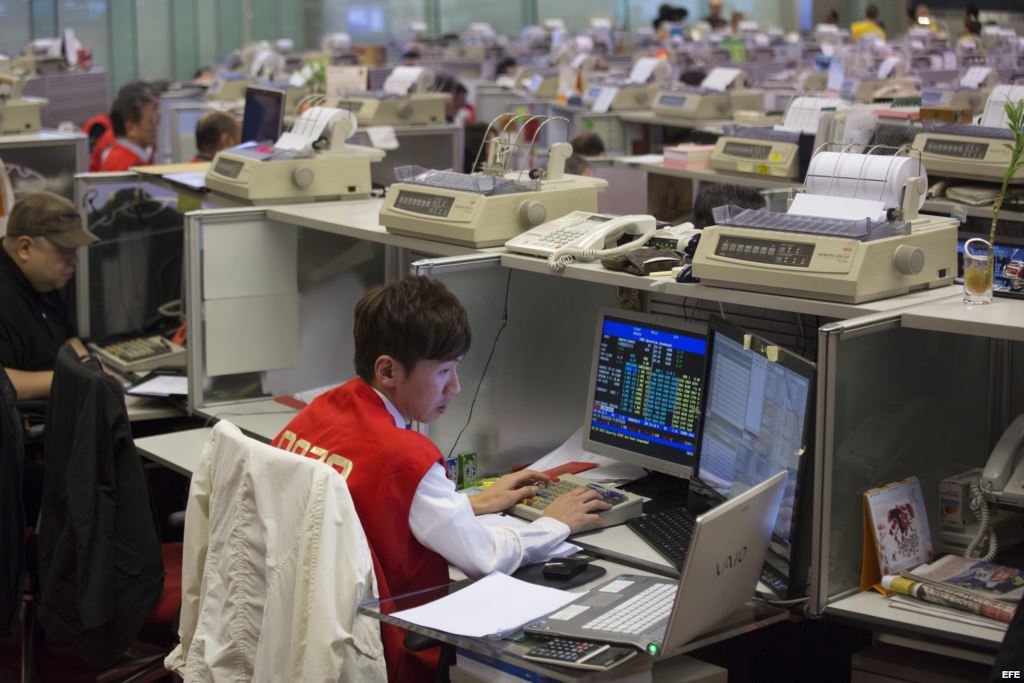More about this exhibition of poster art and Rolando is here.
The Government Paints an Idyllic Country for Foreign Investors / 14ymedio
14ymedio, Havana, 5 November 2014 — The documentation that the Cuban government has distributed among potential foreign investors for the purpose of capturing some 8.7 billion dollars for development projects on the Island highlights the country’s “favorable business environment.”
The Opportunities Portfolio and Guide, to which 14ymedio has had access, highlights the “restructuring of the country’s policies since the updating of the economic model,” even though the reforms promoted by President Raul Castro since 2007 have not solved the many problems that strangle the system.
The so-called Raulist reforms have not prevented the economy from growing at a slower pace than officially forecasted. According to government calculations, the Gross Domestic Product (GDP) will close the year with an increase of 1.4%. Nevertheless, independent analysts think that this figure does not reflect the real state of the economy.
Throughout 168 pages, the Opportunities Portfolio insists on the presence of a “regulatory framework and an updated foreign investment policy and incentives for investors.”
The document mentions the existence of a “secure and transparent body of law” and “promotional institutions at the service of investors” as well as a “climate of security for foreign personnel,” when a little more than a month ago the severe sentence imposed on Canadian entrepreneur Vahe Cy Tokmakjian was made known.
This case, often considered a test for those who plan to invest on the Island, concluded with the 15-year prison sentence for the President of Tomakjian Group for various corruption crimes. Along with him, another 14 Cubans were condemned to sentences of between six and 20 years in jail.
The Portfolio also praises the “high indicators in matters of education, social security and health of the population,” even though the island is going through a delicate situation from the epidemiological point of view. In recent months, the spread of dengue fever, cholera and chikungunya may have caused dozens of deaths throughout the country, although health authorities have not supplied reliable figures.
The document also celebrates the presence of basic infrastructure throughout the whole country, including railways and roadways, in spite of the fact that the bad state of the highways has caused more than 5,600 accidents in the first half of this year, with a balance of 347 deaths and more than 4,300 injuries.
Translated by MLK
Virtual Reality? / Fernando Damaso
When I hear some of our nation’s leaders talk about the Republican era — and many of officials repeat what they say — I get the impression the country was one vast wasteland, without an education or public health system, without highways, aqueducts, sewers, water mains, electricity, telephones, hospitals, schools, factories, businesses, cinemas, theaters or many other things.
Could it be that our towns and cities were a highly developed virtual reality? Does what we see today, now all quite dilapidated, not exist before 1959?
In reality it all existed. Furthermore, it was in even better condition than today and was continually getting better. When you have no important accomplishments to your credit but rather only a series of failures, you must deny the existence of everything that came before, which allows you to pretend you were starting from scratch. Then whatever you have done, good or bad, becomes the sole reality. That is what we have tried to convince the younger generation, who have no firsthand experience of the Republican years.
When we ourselves were young, we were proud of our country. We respected the national anthem, the flag and the coat of arms. We were aware that not everything was perfect or even worked well, but we tried to improve things and, most importantly, we did not leave Cuba. The only aspiration of today’s younger generations is to emigrate to some other part of the world where they can realize their personal goals. They have lost any hope of being able to solve all the many problems which have accumulated over the years. This is the reality, and not the virtual kind.
I remember a scandal from the Republican era that involved an intoxicated US Navy seaman desecrating the statue of José Martí in Havana’s Central Park. Today, some Cubans use this site and the doorways of the surrounding buildings as a public urinal, mainly at night, in the face of widespread public indifference. Anyone wishing to verify this need only take a stroll through the area in the early hours of the morning. In reality there is much that has been lost, and not just material things.
When historical continuity is severed and whole eras are distorted or swept aside, you get the situation we have in Cuba today. The country is no longer of interest to most of its citizens. Everyone carves out his own little personal corner and adapts it to meet his needs, forgetting about everyone else.
3 November 2014
A Survey from Granma / Regina Coyula
In its Friday edition, the newspaper Granma has asked readers to fill out a questionnaire with the laudable goal of improving its quality. I’ve had some great times with Granma, but this survey marks one of the highpoints.
Among the questions is whether the news presented is timely, if the way it is presented is original, if articles create an information vacuum because they lack insufficient (I assume they mean sufficient) data, if topics are repetitive and if there is follow-up. This is a joke; the first thing readers who get their news exclusively from Granma or any other national news outlet need is references.
People more serious than I will take the time to analytically answer the survey in question, but if one were to ask how the newspaper is doing, there are several possible answers: 1) Very good, 2) Good but could use improvement, 3) Bad — certainly one that would have to be included — and 4) Very bad.
Granma is not the worst newspaper in the world. That would have to be Rodong Sinmun.* Remember that we are talking about the official media outlet of the Communist Party, which is almost like saying the only news outlet since all the others parrot its editorial line.
With or without the survey, Granma will continue to be in high-demand for the subsidiary role it plays in personal hygiene and home care.
An anecdote: My son once asked a friend to read the above-mentioned publication and if there was anything interesting in it. Tossing aside the newspaper and dragging out his response for emphasis, the friend gave a very enlightening answer:
“Nothing. It’s all a Granma.”
*Translator’s note: Worker’s Newspaper, the official newspaper of the Communist Party of North Korea.
3 November 2014
"Better Plastered than Perfumed" Revolutionary Fragrances / Juan Juan Almeida
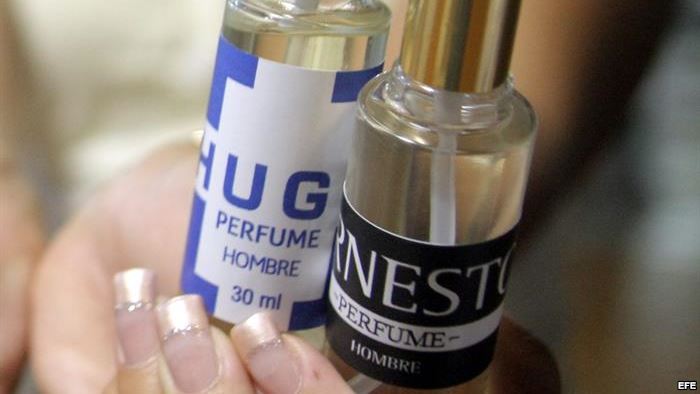 The uproar from the Council of Ministers of the Republic of Cuba was of considerable proportions. At a presentation of the recent Labiofam* 2014 conference, two new perfumes were introduced which, according to company officials, had been named “Ernesto” and “Hugo” in an attempted tribute to Ernesto “Che” Guevara and Hugo Chavez.
The uproar from the Council of Ministers of the Republic of Cuba was of considerable proportions. At a presentation of the recent Labiofam* 2014 conference, two new perfumes were introduced which, according to company officials, had been named “Ernesto” and “Hugo” in an attempted tribute to Ernesto “Che” Guevara and Hugo Chavez.
At first I thought it was a logical reaction, given that its creators described Ernesto as having a woodsy and sweet bouquet, and Hugo as having hints of tropical fruits. Some expert “noses,” however, insist that both essences smell more like public restrooms at Carnaval.
The official announcement published in the newspaper Granma left more questions than answers, and was less credible than Alejandro Castro Espín’s mechanical engineering degree. After years of using the names of both men to christen parks, lodges, schools, factories and even cantatas without proper consent, the Cuban Communist Party said through its official news outlet that “initiatives of this nature will never be accepted by our people or the Revolutionary government.”
The collective memory of Cuba’s leaders appears to be failing. They seem to have forgotten that on July 27, 1983 Celia Sánchez Manduley*, described as “the most beloved flower,” became synonymous with a useless textile manufacturer, that an ineffective building contracting business was named after Blas Roca Calderío* or that the name for the unproductive construction company Almest was created out of the last names of Juan Almeida* and Armando Mestre*.
It is worth remembering that in 1994 — the same year Fidel Castro agreed to pose for the magazine Cigar Aficionado sniffing a Cohiba Lancero — Labiofam brought to market three fragrances imported from France: colognes labelled Alejandro, Celia and Havana. As a press statement of the time indicated, “the first two are products with allegorical names for figures of the Revolution.”
José Antonio Fraga Castro — nephew to Fidel and Raul and director of Labiofam — wanted to repeat David’s feat against Goliath and pave the way to their loyalty with the asphalt of this odiferous hypocrisy. But he did not know how to use the sling and ended up with a huge bump on his head. He forgot that the iconic image of Che, which was launched and promoted by his uncles, has its own copyright. Fidel Castro is the product, the pedestal, and the only official model which can promote the Cuba brand, as Raul has decreed
In 2002, the village of Birán* — a hamlet within the municipality of Cueto that is about 45 miles from the city of Holguín and about 19 from Marcané — was declared an open-air museum. It was crowned a National Monument in early 2011 by government decree and became an obligatory overnight stop for tourists to the area looking for a distillery.
In case you didn’t know, the profitable home rum authorized by the Revolutionary government, which according to its official news outlet “does not endorse projects of this kind,” was given the name Comandante Fidel. It is exported by the Cuban firm Tecnoazucar, and bottled and labelled with Fidel’s image by the Spanish firm Abanescu, S.L., located in La Jonquera, Catalonia.
As an old urban prophet author ot Politicaductor, or a new translator of Cuban political thought wrote: “Better I smell Kurdish than perfumed.”
*Translator’s notes: Labiofam is a Cuban veterinary and pharmaceutical products company. Alejandro Castro Espín is Cuban president Raul Castro’s only son. Celia Sánchez Manduley was a leading figure in the Cuban revolution with close personal ties to Fidel Castro. Blas Roca Calderío was a revolutionary figure who later served as head of Cuba’s National Assembly. Juan Almeida and Armando Mestre were also prominent figures in the Cuban revolution and the former was this blogger’s father. Birán is best known as the birthplace of Fidel Castro.
Spanish post
7 October 2014
Long faces and empty pockets / 14ymedio, Reinaldo Escobar
14ymedio, Reinaldo Escobar, Havana, 1 November 2014 – One of the distinctive features of the new era in Cuba is that it is no longer shortages but pricing that explains the difficulty of acquiring food grown on the island, but at bottom the issue is the same as always: lack of productivity.
For decades Cubans “got used” to the non-existence of certain agricultural products. Especially in the ‘60s and ‘70s when there was a stronger dependence on the ration market and consumers felt more like users than customers. The production plans were conceived to satisfy, barely, the rationing plan and there wasn’t even a way of marketing the excess.
Every time policies emerged that tended towards openings –such as the farmers markets of the ‘80s – fruits, vegetables and meats absent from the ration book reappeared on the stands, but along with the happy return of mamey, lettuce and malanga, also appearing were the long faces of those who didn’t even bother to reach into their pockets when they saw the exorbitant prices.
Then the righteous zeal of the Maximum Leader, his unbridled voluntarism, decided to prohibit these manifestations of mercantilism and beans, onions, and of course meat, were once again lost to us. Like the erratic gait of Ruperto, a TV comic character of our time, every two steps forward necessarily entailed one step back.
But the long faces of the “disadvantaged” still demand some Robin Hood to bring order to the Sherwood Forest. In letters from readers of the newspaper Granma or on the National Television program “Cuba Says” the indignant tear their hair out in the face of “the abusive prices that unscrupulous intermediaries impose to profit on the needs of the population.” It is recognized that the producers and the sellers are now sheltering under the law of supply and demand and therefore are authorized to set the prices they want, but others think that there should be “a limit” because consumer protection should come first.
On this topic, the commentator Talia Gonzalez said this week on the TV magazine Buenos Días, “We have to recognize that the experiment undertaken in the provinces of Havana, Artemisa and Mayabeque for the last year has enabled the expansion of supply and variety in the markets, but now there is another phenomenon: the products are there, but in many cases they are inaccessible…”
There has been an 18 percent increase in production over the previous year, but this isn’t reflected in prices
Officials in the Ministry of Agriculture affirm that there has been an 18 percent increase in production over the previous year, but this isn’t reflected in the prices because the supposed increases are destined principally to replace imports or to fulfill commitments to schools, hospitals and other social sectors, which are not always met.
The blame for the problem lies entirely in eminently subjective issues, such as the lack of control and demands, the arrears in payments or the failure to meet contracts, but there is something deeper, closely related to the nature of a system that, however much they try to update or perfect it, still has the same essence.
When a farmer realizes that 100 pounds of onions sold at 40 pesos a pound brings in the same as 800 pounds sold at 5 pesos a pound he has discovered, without needing to be an economist, sociologist or politician, that in Cuban society today for every economically favored consumer, there are eight who are not.
That is, if in Cuba there are approximately one and a quarter million people with sufficient purchasing power to absorb what little is produced, at the stated price, there will be no interest in increasing production, unless by some miracle the communist prophecy is fulfilled where work will become the first human need, beyond narrow material interests.
What a discovery! The system can’t function as long as it tries to maintain a policy of equity and justice, while aspiring to an efficient and sustainable economy. It is not that the producers have been given too much freedom, but rather not enough. At least as much as necessary so that, from the ruins of a proletariat forced into corruption to survive and a peasantry fearful of putting their prosperity on the display, an empowered and entrepreneurial middle class can emerge. But such an idea, so liberal, doesn’t fit in the straitjacket of the Guidelines of the 6th Communist Party Congress.
It is historically proven that productivity grows not only when there are the necessary technological and scientific requirements to make the performance of the productive forces more efficient, but also when there is a need to increase production and that need is backed by the purchasing power of consumers. Otherwise the hungriest countries would be the most productive but, sadly, the opposite happens.
At every hierarchical, academic and political level they know that this serpent doesn’t stop biting its tale, but in the inaccessible premises where the great decisions are taken they are afraid to recognize that unviability is a regular part of the socialist system they learned as a catechism from the Soviet manuals. They will never recognize it, unless the dissatisfied with their long faces move beyond their irritations at the prices in the market stalls, and channel their anger and frustration where it belongs.
Cuba: The fight against Ebola is the new theater of war / Juan Juan Almeida
Every interesting story has light and dark parts, epic actions, and a protagonist who inspires. The rest consists of weaving reasons and emotions together by way of origami.
The Cuban government knows very well how to put into practice its habitual juggling act in order to locate itself opportunely at the center of all news flashes. Cuban doctors have been sent to fight the Ebola epidemic in West Africa, and by taking advantage of this, the government feeds the false image of having no self-interest in this new theater of war, where everything is tested, even human sacrifice.
We could see that during the recently-concluded Summit of the Bolivarian Alliance for the Peoples of Our America Trade Treaty of the Peoples (ALBA-TCP) the moment of emotion was at the meeting of the heads of state, delegations, and invited personalities with the Cuban collaborators from the medical brigades, who that same night, October 21, left for Liberia and Conakry, Guinea.
Hail, Caesar; those who are about to die salute you. They know that if they become contagious they can’t come back to the country until they are cured or die. A hard but wise decision, because the island is not prepared to receive the sick without activating the usual chain of errors that, as we already know and even have suffered, facilitated the epidemic proliferation of conjunctivitis, cholera, chikungunya, dengue fever, and a long list of contagious etceteras.
The photo of the Summit is beautiful, but the Summit didn’t provide much. A declaration with 23 points of agreement and little money. Cheap politicking. The illness continues unabated. According to data offered by Mr. Bruce Aylward, the Assistant-Director General of the World Health Organization, the situation is alarming. They have confirmed cases of infected people in seven countries, and it’s estimated that by the beginning of this coming December, if things continue as is, the number of people infected with Ebola could reach 5,000 to 10,000 cases weekly.
It’s clear that the Cuban government wants to pursue more than just aiding and combating the mortal virus. With this new crusade, in addition to confronting an emergency, it will receive a spurt of dollars to spend excessively without needing to justify it. The government is developing a strategy to favorably influence the UN vote on human rights and the American embargo. A key point.
It’s clearly persuasive. There is no greater veneration in the human condition than for the action of saving lives — even more captivating when the effort means risking your own.
We can criticize them or see from the computer how General Raul Castro and his buddies are gaining space in Realpolitik (practical interests and concrete actions). The other option would be to equal or, even better, to surpass them. To silence, with real actions, the humanitarian chatter of the Cuban revolution, its hapless friends of ALBA, and its cousins in the TCP.
But for that we would have to be ready not only to help the needy but also to define who we are and what exiled Cubans can do. To act together with international organizations who work in the center of the crisis. To buy medical and hygienic supplies, protective uniforms, stretchers, gloves, disinfectants, and instruments for the centers that treat the sick. It’s not difficult.
Certainly we can continue believing that we create a homeland on the Internet, or we can grab the limelight away from the revolutionary government. But that, paraphrasing the title of the bolero, is for you to decide.
Translated by Regina Anavy
27 October 2014
The Good USAID and the Bad USAID / Yoani Sanchez
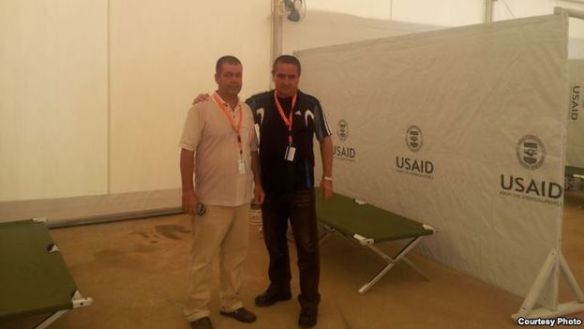
YOANI SÁNCHEZ, 3 November 2014 — Just a few months ago we experienced an avalanche of official propaganda targeted to attacks on the United States Agency for International Development (USAID). Those initials came to represent the enemy with whom they frighten us from our television screens, platforms, and even classrooms. However, to our surprise, this week we’ve learned that some Cuban doctors arriving in Liberia will work in a field hospital financed by this “terrible agency.”
Although the official press has avoided publishing pictures showing our compatriots next to the logo of USAID, the odd photo has escaped censorship. So suddenly, there is a crack in the story of confrontation, the rhetoric of the adversary does not hold water, and clearly evident is all the moral relativism of those who fabricate the ideological crusades with which they bombard us from the mass media.
Could someone ask the Associated Press (AP) to investigate as soon as possible this “secret” conspiracy between the Plaza of the Revolution and an agency that receives guidance from the U.S. State Department? We are eager to see the rivers of ink that this strange collaboration provokes, the “revelations,” the secret memorandums and the veiled-face confessions that explain such a collaboration.
However, the answer that will be given by those who reject USAID support for Cuban Civil Society but seem fine working shoulder to shoulder with the island’s authorities, will be that in humanitarian issues have no political colors. As if to inform and technologically empower oneself weren’t a question of survival in the twenty-first century. The official press, for its part, will rush to explain that, when it’s about saving lives, Cuban doctors are willing to put aside their differences. But none of these is the real explanation.
The bottom line is that Raul Castro’s government is eager to express and receive belligerence from its great northern neighbor. What it will not tolerate and will never accept is grants to or recognition of the belligerence of its own civil society. It is anxious to take a family photo with Uncle Sam, as long as no one invites the bastard nephew that is the Cuban population.
Power is attracted to itself, these images of the last few days want to tell us. If a young Cuban receives a text message summoning him to an alternative concert, he should be careful – according to what the official commentators warn us on our little screens – because the imperialist could be behind each character. They don’t use the same ethical yardstick, however, to evaluate a health care professional who works under the tent, over the stretchers, and with the syringes funded by USAID.
How are they going to explain to the children, who have spent months being frightened by the United States Agency for International Development, that now their fathers or uncles who went to Liberia are working in a hospital built with funds from that agency?
When Ronald Hernandez Torres, one of the Cuban doctors who traveled to Liberia, wrote on his Facebook page that “this unit has the best conditions for patient care, and the best professionals from different countries working side by side,” did he, perhaps, know that all this is being funded by the same agency that is latest nemesis that the Castro regime has found to frighten us with?
As always happens, the cries of political hysteria end up drowning out the voices that raise arguments. Although, as a general rule, the official version is usually imposed because it is the highest insult, this should not discourage us to look for the reasons and to reveal the contradictions of their discourse.
I now know, that at the end of the year, when we look at the balance of reporting in the headlines of our national newspapers, the impression will be that the Havana government and USAID are irreconcilable enemies. But it is a lie. The principal confrontation that continues to be set in stone and without ceding an inch, is what emerges from the powers-that-be in Cuba toward their own people.
Abel Prieto Attacks The “Packet” and “Technological Nomadism” / 14ymedio, Rosa Lopez

14ymedio, Rosa Lopez, Havana / 1 November 2014 — Why do young people prefer video games to the high-flown revolutionary exploits that national television displays? Is the audio-visual “packet” displacing official programming? Those questions hang in the air – although without being directly enunciated – at the Forum on Cultural Consumption in Cuba: Art, Culture, Education and Technology, which is being held this weekend in the Mayo Room of the Cuba Pavilion.
Participating in the official event are Abel Prieo*, Raul Castro’s adviser on cultural topics, Miguel Barnet and other members of the Cuban Union of Writers and Artists (UNEAC) and the Saiz Brothers Brigade. The meeting of intellectuals takes a critical stance in the face of an avalanche of material – uncontrolled by government – that is circulating within the country, especially through the so-called “packet” or “combo” that is distributed by alternative means.
The manifest purpose of this event is to diagnose the ways culture is consumed in Cuba and accordingly “to create an alternative platform for art, education and new technologies and in this way reach a much wider audience.”
Abel Prieto stated in one of the sessions that it seemed to him “that the intellectual position of irrational rejection of new ways of consuming culture is as harmful as that of a post-modern relativism which accepts everything as good. That relativism brings us a blurring of precisely the objectives of a cultural policy, the objectives of the humanism that today is absolutely in bad shape.”
In the forum several references were made to the topic of video games, and Prieto himself judged it as “a complex and dialectical process,” to immediately add that “some are inoffensive, but others are essentially violent and become an addiction.”
Cuba thus seems to be peeping out to the great modern debates about violence and addiction to which video games may give rise, but for the moment it is only permitted to publicly discuss a portion of those involved in the possible problem. The government’s cultural policy tries to determine from above what each Cuban sees on his television screen and what is good or bad for his subsequent social attitude.
Abel Prieto also attacked the “packet” and “technological nomadism” through storage devices like USB memory. The ex-minister of culture opined that “one of the tricks of these new ways of consuming culture is that they give the idea that the person is choosing what he wants to consume, but he does it from the paradigms that are imposed on him. Democracy and diversity are hidden beneath a trap of the hegemonic agenda of the entertainment.”
As evidence that the ruling party surrenders before the existence of those phenomena, Prieto ventured that “we have to promote more diverse and inclusive packets.” The problem is that the greater part of the Cuban people are no longer willing to have officialdom make their audiovisual menu for them.
Tedium, low-quality production, excessive ideology and secrecy have for too long characterized the audiovisual products cooked up in the laboratories of the Communist Party Central Committee Department of Revolutionary Orientation (DOR), the entity that governs television programming and the content of all national press media.
However, the recent speeches in the Forum also hint at alarm. Abel Prieto asserted that “at no time will the State cede to private individuals the decision of cultural policy.” His immediate call “to not demonize new cultural consumption in an authoritarian manner” did not manage to erase the implicit threats in his prior words.
“Hopefully knowledge and cultural information will come into fashion,” concluded Prieto, but he failed to include in that sentence the adjectives “revolutionary” or “politically correct” which always hang over every audiovisual production promoted and encouraged by the ruling party.
Regrettably, culture continues to be governed more by political statements than by demands for education or personal growth.
This morning the Forum’s sessions will continue, missing the voices that defend video games, the “packet,” and the democratization of information.
*Translator’s note: After being ousted as Minister of Culture Prieto was given the title of “Cultural Advisor.”
Translated by MLK
Displaying Those Who Watched Us / 14ymedio, Eliecer Avila
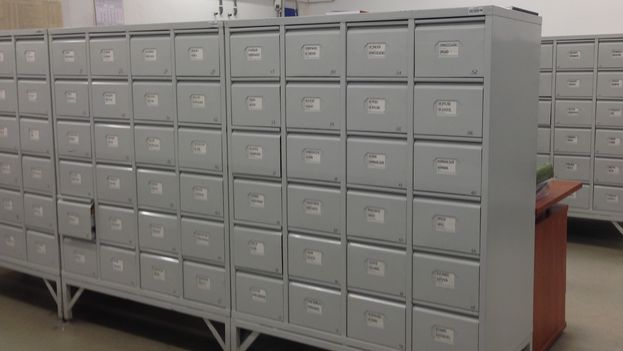
14ymedio, Eliecer Avila, Warsaw, 23 October 2014 — Recently, a wide cross section of Cuban civil society and opposition has been invited to Poland. The program has included a broad array of activities; including a visit to a jail and the governmental palace, meetings with important political figures, debates and lectures.
What has struck me most was entering the archives of Polish Communist State Security. I had only seen such a degree of paranoia and meticulousness in movies, like the classic “The Lives of Others.”
But this time was different. We found ourselves face to face with 90 kilometers of documents, hundreds of thousands of records, operative cards, photos, video tapes, personal profiles, and information about collaborators and people under surveillance.
These records prove that in all the Russian communist colonies there existed similar repressive agencies that turned into the biggest and most sophisticated institutions of their time. The surveillance and repression of thought was the activity to which those countries devoted the most resources.
The National Remembrance Institute leads investigations to purge the responsibilities in thousands of crimes committed by State Security against Polish citizens, always under the guidelines of the infamous Soviet KGB.
The information that these documents hold even today can be vital for many people who aspire to occupy public office, now that new democratic institutions usually ask those in charge of the archive to investigate if in the past such-and-such a person collaborated with State Security.

The documents also reveal that practically no one escaped security surveillance. Priests, artists, intellectuals, diplomats, business owners, all foreigners and even the Communist leaders themselves were spied upon. To that end they used the most advanced techniques of the time, like steam machines to unseal and then reseal letters, microphones inside of homes, hidden cameras and personal tracking, among others.
Even Fidel Castro himself had his file in the archives of the Polish State Security
Even Fidel Castro himself had his file in the archives of the Polish State Security, even when cooperation was very tight between all the repressive bodies of the Soviet bloc, including Cuba.
In spite of all that Mafioso and apparently infallible machinery, the people knew how to find their way and free themselves from so much sick perversion and, in the majority of cases, undertake a road towards true development, with a foundation in a government of law and in open and democratic politics.
The gray days dominated by fear and sadness were left behind to give way to a multitude of colors in the plazas of cities like Warsaw and Cracow, converted into reference points for constant growth and improvement.
I am absolutely convinced that one day in the not-too-distant future we will show delegations from all over the world the archives and installations of State Security in Cuba. Officials and collaborators of the repressive apparatus will be like naked kings before the astonished gaze of new generations formed in pluralism and respect for others in order to rebuild the nation.
Translated by MLK
To Better Illustrate a CNN Report / Rebeca Monzo
To the Directors of CNN: I have inserted here just a few photos of our city (Havana). There are many hardships borne by the residents of any neighborhood, including Miramar, with respect to garbage collection. The state-run company, Comunales, which is charged with this task, alleges a lack of trucks and containers.
Neighborhoods that are located far from the city center do not even have garbage cans. Thus, the waste is thrown into the river, on the train tracks, or — in the best of cases — is hung from nails on the trees.
It would be very good if, when you are broadcasting a report based on statistics, that you do this from the location that is the subject of the report, and not just base your information on numbers provided by a totalitarian regime.
Translated by: Alicia Barraqué Ellison
31 October 2014
If Cuba Strikes Oil, What Then? / Anddy Sierra Alvarez
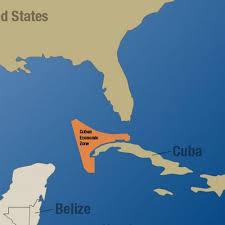
The Cuban government is betting on the Port of Mariel to strengthen its economy, but what would happen if crude oil were found in Cuban territory?
Many Cubans are not very confident of “progress.” The government boasts of this being the definitive path to the Island’s development. Is it possible that the government has a development structure in place?
It is true that the Cuban economy lacks a solid base, following commercial experiments in the interior that continue to constrain Cubans and prevent their development. All because of political fears — one being to limit personal enrichment to prevent an individual from directing his spending power towards a possible career or political confrontation.
With Cubans thus constrained since 1959, chaos has reigned in the gross national product of Cuba. The most recent crisis was the “opening” of the private sector. The government had no choice in the matter — it was not intended as a social development. Inflation had reached the limit and something had to be done. This was not an audacious decision to maintain the internal equilibrium of the country. continue reading
Private-sector employees, who as of September 2014 numbered 99,395 self-employed workers, cannot develop an entrepreneurial project no matter how small it is. They are limited to dealing in raw material acquired on the Island, or rather, to engaging in retail transactions that have created major stress in the community.
Let us imagine that we now have petroleum, that we found a full well, sufficient to satisfy all commercial needs and propel the country towards development and future ranking among the 10 major economic players in the world.
All seems to be going excellently: the Cuban will become a person, he will earn his own livelihood, and he will recapture all that was lost throughout the years. Social values, human rights, democracy, social conscience and a political experience will flourish that today are lacking among the inhabitants of the “Great Green Caiman.”
But, how many years will it take to see these changes? Will the regime give the green light to social progress? This seems doubtful. No! The central nervous systems of these socialist — sorry, communist — leaders cannot fathom anything other than absolute power. Their godfathers (Fidel and Raúl Castro) have inserted values from another galaxy into a alternate future.
Let us suppose that I now want to own a business. I manage my resources and funds to build a GNC store to sell nutritional supplements – monohydrate creatine, L-carnitine, whey proteins, Centrum, etc. (just so you understand what I’m talking about).
With the policies in place currently and in the future, I cannot do this. I am limited to doing business with foreign business interests. There exist only state eentrepreneurs directly linked to the government, who are authorized for this type of activity. Clearly, the government’s interests are assured with these individuals.
How will the island develop? Only if we, Cuban citizens, are an important link in the chain of our country’s development. It is very clear that we are not part of the system, that we do not count, except for where there are direct benefits to the State. Only for the Census does everyone count.
It is a simple proposition: I have my store, I make progress in my personal economy, I contribute taxes to the country, and my family also benefits.
Just like me, many others embark on this path — unlike in the current “private sector” model, which is a lie. Thievery, diversion of resources, and inflated prices comprise this so-called “private sector.”
What is wrong with this picture? That there are different social classes in Cuba? This has been the case for many years.
The leaders belong to the high class, and the inhabitants, for the most part, belong to the low class, and a few are in the middle class (aided financially by their relatives abroad). So, there are social differences! Or, I’m mistaken.
Truly, there is no hope unless there is a change in the form of government. The leaders of the Revolution are in their “third age” or beyond. The new generation of leaders will assume hereditary places, not earned promotions, having been bred on very totalitarian politics.
The key to development is not just about striking oil. It is about fundamentally changing the commercial and social structures of the country. It is about thinking differently, something which today will land you in the ditch. If you don’t believe me, just ask the Cuban opposition.
It is curious that Fidel defines his concept of Revolution as “everything that needs to be changed.” Well, the way everything functions today is apparently still good as far as he is concerned — if he is still even capable of rational thought, that is.
Translated By: Alicia Barraqué Ellison
13 October 2014
Indifference (With Background Music by Juan Formell) / Regina Coyula
I just wrote a text for the BBC where I used my own experiences to illustrate how, faced with everyday situations, the questionable breeding of the citizenry is on display. Either I have very bad luck and ride buses where trouble breaks out, or this is so widespread that it happens to anyone.
The Chinese-made Yutong buses have a platform facing the back door on one side which, according to the original design, is for baby strollers and other impediments, but here they are occupied, almost without exception, by passengers. In one of these buses whose problems haunt me, a full but not crammed Route 69, there was a passenger with a huge sack which he had placed on a corner of the platform.
Across from the Clinical Surgical Hospital on the 26th, a couple got on by the back door with a disabled woman in a wheel chair, and the man accompanying her cheerfully asked the man with the sack if he could make space for the wheelchair so that the disabled woman could use the rail to help lift her weight.
The reaction of the man with the sack was defensive: there wasn’t any room, the wheelchair would only fit sideways, etc. An older gentleman who was riding standing up, ignoring his partner pulling on his sleeve, intervened to accuse the man with the sack of being insensitive.
The disabled woman and the couple with her were silent, but their discomfort was obvious. The man with the sack turned to the gentleman, “Insensitive, me? Don’t fuck with me, I rode this same bus yesterday with my two-year-old son and no one gave me a seat or held the boy, so mind your own business, it’s got nothing to do with you.”
Silence, even from the gentleman whose lady companion had successfully counseled him not to respond. The disabled woman got off at Santa Catalina and Vento and the two couples further on. The man with the sack continued his soliloquy. I imagine he was trying to justify himself.
Only after alighting on the street, two riders exchanged meaningful glances as if to say, one to the other, “In this country we have lost the capacity to care,” and the other replying, “Yes, nobody cares about anyone anymore.”
Translated with considerable help from Alicia Barraqué Ellison
8 October 2014
Chinese Businesses on the Hong Kong Stock Exchange? / Juan Juan Almeida
The physicist and nuclear energy specialist Fidel Castro Díaz-Balart* recently led an official Cuban delegation to Hong Kong, though the news happened, as we say, behind the scenes. Xinhua, Prensa Latina and other news agencies did not report it, perhaps because the visit was not important.
Or perhaps it was because the eldest son of the leader of the Cuban revolution found it inconvenient to reiterate, somewhat unconvincingly, that he has no political ambitions, though he serves as scientific advisor to Uncle Raul, currently President of the Republic of Cuba. Or maybe it is because this is not his first visit to China.
Back in October 2011 the bearded sexagenarian — he was born September 1, 1949 — who says he spends hours surfing the internet, was a guest in Beijing, where he met with the septuagenarian Liu Yandong, who at the time was Chinese state councilor and is now second vice-premier of the People’s Republic of China. Such is the diversity in China that she is one of only two women members of the Politburo of the Central Committee of the Chinese Communist Party. continue reading
But more to the point, on that occasion the Cuban academic, who is a graduate of Moscow’s Lomonosov University and the I.V. Kurchatov Institute of Atomic Energy, showed an interest and looked for areas of cooperation in technology and nanotechnology between Cuba the Asian giant.
So it would be reasonable to assume that had returned to scrounge up investors. But that was not the case, though he was seen yachting around Victoria Harbor, contemplating the city’s majestic skyline. He was not at this famous port looking for financially solvent businessmen. This time he had a more urgent task: He was seeking access to technological and financial advisory services.
He is not waiting around. The Hong Kong Stock Exchange is one of the eight most important in the world and seems to have become the focus of of Cuba’s business and development ambitions, which involve floating shares of Cuban state enterprises on the exchange, especially those related to science and the pharmaceutical industry.
I am not an economist and cannot confirm whether this is a move by the Cuban government to simply to play one of its cards or an attempt to rig the board. But as has been pointed out by various observers who have been studying China since 1978 — the year Deng Xiaoping put in place the reforms in agriculture, defense, science and technology known as “The Four Modernizations” — the new Chinese policy represented a change in focus toward economic development and marked the beginning of a new Chinese openness to the world.
One of the most significant steps was to get Chinese state enterprises listed on the Hong Kong exchange. Thanks to market speculation, some of these companies — even those with very low levels of financial efficiency — managed to be among the top performers of the exchange’s index.
I believe that the strategy of floating shares in Cuban state enterprises in this or some other international stock exchange would not only be a major development; much more importantly it would mark an interesting shift in the traditional approach the Cuban government and the Ministry of Foreign Trade and Investment now take of rejecting or approving the participation of foreign investors in the Cuban economy.
Just a thought.
The calendar indicates that today is the feast day of the patron saint of Cuba, Our Lady of Charity of Cobre, whom we ask to grant us health, liberty and the unity of all Cubans.
*Translator’s note: Fidel Castro Díaz-Balart is Fidel Castro’s first son by his first wife.
8 September 2014
Cardenas Court tries providers of a Wi-Fi network / 14ymedio
14ymedio, Cardenas, 31 October 2014 – A strong State Security operation on Thursday prevented activists and independent journalists from attending a trial held at the Cardenas Municipal Court at 2:00 PM against five young people who installed an extensive Wi-Fi network in this town, according to a report to 14ymedio from independent journalist Leticia Ramos, who was expelled from the court and briefly detained.
The defendants, who were no older than 30, had been the object of a complaint by the Cuban Radio Company. They are accused of illegal economic activity, a crime under Article 228.1 of the Penal Code, facing a sentence of three months to one year imprisonment. If the aggravating circumstance of use of materials or means of illicit origin is proved, the sanction is one to three years imprisonment, in addition to confiscation of the property involved.
The prosecutor couldn’t prove that “any of the servers were stolen or had entered the country illegally,” a person who didn’t want their name published told 14ymedio. continue reading
The case had already been announced in the local paper Girón last 26 June, when there was great anticipation to know the results.
The defendants were arrested during an impressive police operation last June, when the network that received audiovisuals over the Internet and distributed them through a wireless network was dismantled.
At that time, Girón reported that an individual “behind the façade of a ham radio operator, installed several antennas in his home.” The official media report warned that this type of action fostered “the circulation and consumption of alienating audiovisual materials.”
Several people were caught taking notes and were expelled from the court. Sources close to the families of the accused reported that the prosecutor asked for high fines and the permanent confiscation of all the materials seized.
The trial concluded pending sentencing, with the expectation that the accused will receive communications about their sentences in the next few days.

